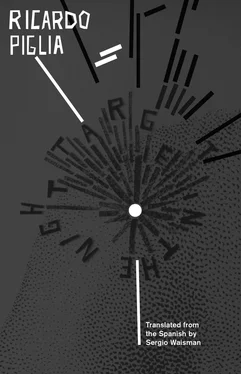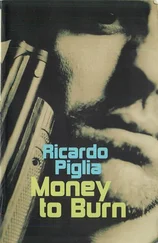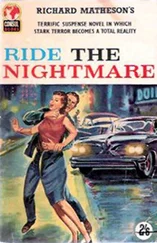Ricardo Piglia - Target in the Night
Здесь есть возможность читать онлайн «Ricardo Piglia - Target in the Night» весь текст электронной книги совершенно бесплатно (целиком полную версию без сокращений). В некоторых случаях можно слушать аудио, скачать через торрент в формате fb2 и присутствует краткое содержание. Год выпуска: 2015, Издательство: Deep Vellum, Жанр: Современная проза, на английском языке. Описание произведения, (предисловие) а так же отзывы посетителей доступны на портале библиотеки ЛибКат.
- Название:Target in the Night
- Автор:
- Издательство:Deep Vellum
- Жанр:
- Год:2015
- ISBN:нет данных
- Рейтинг книги:3 / 5. Голосов: 1
-
Избранное:Добавить в избранное
- Отзывы:
-
Ваша оценка:
- 60
- 1
- 2
- 3
- 4
- 5
Target in the Night: краткое содержание, описание и аннотация
Предлагаем к чтению аннотацию, описание, краткое содержание или предисловие (зависит от того, что написал сам автор книги «Target in the Night»). Если вы не нашли необходимую информацию о книге — напишите в комментариях, мы постараемся отыскать её.
is an intense and tragic family history reminiscent of
, in which the madness of the detective is integral to solving crimes.
, a masterpiece, won every major literary prize in the Spanish language in 2011.
Ricardo Piglia
Target in the Night — читать онлайн бесплатно полную книгу (весь текст) целиком
Ниже представлен текст книги, разбитый по страницам. Система сохранения места последней прочитанной страницы, позволяет с удобством читать онлайн бесплатно книгу «Target in the Night», без необходимости каждый раз заново искать на чём Вы остановились. Поставьте закладку, и сможете в любой момент перейти на страницу, на которой закончили чтение.
Интервал:
Закладка:
After a time in the casinos, Durán broadened his horizon, particularly with women. He developed a sixth sense that allowed him to determine a woman’s wealth, to differentiate rich women from female adventurers who were looking for a catch of their own. Small details would grab his attention, a certain caution when betting, a deliberately distracted look, a carelessness in their dress and a use of language that he immediately associated with abundance. The more money, the more laconic the woman, that was his conclusion. He had the class and skill to seduce them. He’d tease and string them along, but at the same time he treated them with a colonial chivalry he had learned from his Spanish grandparents. Until one night in early December 1971, in Atlantic City, when he met the Argentine twins.
The Belladona sisters were the daughters and granddaughters of the town founders, immigrants who had made their fortune from the lands they owned in the area of Carhué, at the end of the Indian Wars. Their grandfather, Colonel Bruno Belladona, came with the railroad and bought lands now administered by a North American firm. Their father, the engineer Cayetano Belladona, lived in the large family house, retired, suffering from a strange illness that kept him from going out but not from controlling the town and county politics. He was a wretched man who cared only for his two daughters (Ada and Sofía). He had a serious conflict with his two sons (Lucio and Luca), and had erased them from his life as if they’d never existed. The difference of the sexes is the key to every tragedy, Old Man Belladona thought when he was drunk. Men and women are different species, like cats and vultures. Whose idea was it to make them cohabitate? The males want to kill you and kill each other, while the women want to go to bed with you, climb into the nearest cot with you at siesta time, or go to bed together, Old Man Belladona would ramble on, somewhat deliriously.
He’d been married twice. He had the twin girls with his second wife, Matilde Ibarguren, a posh lady from Venado Tuerto who was a certifiable nut. The two boys he’d had with an Irishwoman with red hair and green eyes who couldn’t stand life in the countryside and had run away, first to Rosario, and then back to Dublin. The strange thing was that the boys had inherited their stepmother’s unhinged character, while the girls were just like the Irishwoman: red-haired and joyful, lighting up the air wherever they went. Crossed destinies, Croce called it, the children inherit their parents’ crossed tragedies. Saldías the Scribe carefully jotted down all the observations that the Inspector made, trying to learn the ins and outs of his new position. Recently transferred to the town by order of the Public Prosecutor’s Office, which was trying to control the overly rebellious Inspector, Saldías admired Croce as if he were the greatest investigator 2in Argentine history. Assistant Inspector Saldías took everything that Croce said entirely seriously; and the Inspector would, in jest, sometimes call him Watson.
In any case, their stories — Ada and Sofía’s on the one hand, Lucio and Luca’s on the other — remained separate for years, as if they belonged to different tribes. They only came together when Tony Durán was found dead. There had been a monetary transaction; apparently Old Man Belladona had been involved with some transfer of funds. The old man went to Quequén every month to oversee the shipments of grain that he exported, for which he received a compensation in dollars paid to him by the State under pretext of keeping internal prices stable. He taught his daughters his own moral code and let them do whatever they wanted, raising them as if they were boys.
Ever since they were little the Belladona sisters were rebellious. They were audacious, they competed with each other all the time, with tenacity and delight, not to differentiate themselves, but to sharpen their symmetry and to learn to what extent they were really identical. They’d go out on horseback and explore the night like viscachas, in winter, in the frost-covered countryside. They’d go along the ravine and into the swampy ground crawling with black crabs. They’d bathe naked in the rough lake that gave its name to the town and hunt ducks with the double-barreled rifle their father bought them when they turned thirteen. They were very developed for their age, as they say, so no one was surprised when — almost overnight — they stopped going hunting and horseback riding and playing fútbol with the country laborers, to become young society ladies who sent out to have their identical clothes made in an English shop in the capital. With time they went to study agronomy at the university in La Plata, following the wish of their father, who wanted them in charge of the fields soon. People said that they were always together, that they passed their exams easily because they knew the countryside better than their teachers, that they shared their boyfriends, and that they wrote their mother letters to recommend books and to ask her for money.
Around that time the father suffered the accident that left him half paralyzed, so the sisters abandoned their studies and came back to town. There were several versions of what had happened to the old man. That his horse had thrown him when he was surprised by a swarm of locusts from the north, and that he spent the whole night lying in the middle of the field, his face covered with the insects and their razor-sharp legs. That he suffered some kind of stroke when he was screwing a Paraguayan at Bizca’s brothel and that the girl had saved his life, almost without realizing it, because she went on giving him mouth-to-mouth resuscitation. Or also, that one afternoon he discovered, or so people said, that someone very close to him had been poisoning him. He didn’t want to believe it might be one of his sons. Apparently, someone had been adding a few drops of the liquid used to kill ticks in the whiskey he drank at the end of every day, at dusk, on his flower-filled balcony. By the time they realized what it was, the poison had done part of its job, and from that point on the old man couldn’t walk anymore. In any case, before long the family was not seen around town anymore. The father because he stayed in his house and never went out; and the sisters because, after taking care of their father for a few months, they grew bored of being locked in and decided to go abroad.
Unlike all their friends who were going to Europe, the sisters went to the United States. They spent time in California, then crossed the continent by train on a trip that took several weeks with long stops in various cities along the way, until they reached the East Coast around the beginning of the northern winter. They spent the trip staying in large hotels, gambling wherever they could along the way, living the life and playing the part of South American heiresses in search of adventure in the land of upstarts and the nouveau riche.
This was the news about the Belladona sisters that reached town. The information arrived with the evening train that left the mail in large canvas bags on the station platform. It was Sosa, the post office agent, who reconstructed the itinerary of the young women from the postmarks on the envelopes addressed to their father. Complemented by the detailed stories of the travelers and businessmen who came to the bar of the Plaza Hotel to recount what was rumored about the twins among their fellow students in La Plata — to whom they would boast on the telephone, apparently, about their North American conquests and discoveries.
Then, toward the end of 1971, the sisters reached the New York area. In a casino in Atlantic City they met the pleasant young man of uncertain origin who spoke a Spanish that seemed to come straight out of a television series. At first, not realizing there were two of them, Tony Durán went out with both sisters, thinking there was just one. This was a system the sisters had always practiced. It was like having a double do the disagreeable (and the agreeable) tasks for you, which is how they took turns with everything in life. In fact, people in town used to say, each sister only went through half of school, half of their catechism, and even half of their sexual initiation. They were always drawing straws to see which of them was going to do whatever they had to do. Is that you, or your sister? Was the question everyone asked when one of the two showed up at a dance, or at the dining room of the Social Club. Doña Matilde, their mother, would often have to clarify which was Sofía and which was Ada. Or the other way around. Because their mother was the only one who could tell them apart — by their breathing, she said.
Читать дальшеИнтервал:
Закладка:
Похожие книги на «Target in the Night»
Представляем Вашему вниманию похожие книги на «Target in the Night» списком для выбора. Мы отобрали схожую по названию и смыслу литературу в надежде предоставить читателям больше вариантов отыскать новые, интересные, ещё непрочитанные произведения.
Обсуждение, отзывы о книге «Target in the Night» и просто собственные мнения читателей. Оставьте ваши комментарии, напишите, что Вы думаете о произведении, его смысле или главных героях. Укажите что конкретно понравилось, а что нет, и почему Вы так считаете.












